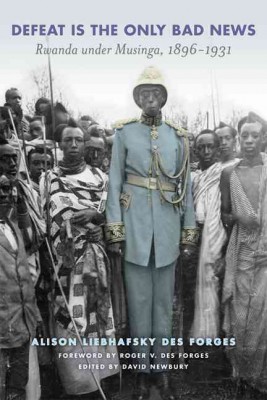| Defeat Is the Only Bad News: Rwanda Under Musinga, 1896-1931 Contributor(s): Des Forges, Alison (Author), Newbury, David (Editor), Des Forges, Roger (Foreword by) |
|
 |
ISBN: 0299281442 ISBN-13: 9780299281441 Publisher: University of Wisconsin Press OUR PRICE: $26.68 Product Type: Paperback - Other Formats Published: May 2011 |
| Additional Information |
| BISAC Categories: - History | Africa - Central - Social Science | Anthropology - Cultural & Social - Political Science | Human Rights |
| Dewey: 967.571 |
| LCCN: 2010038905 |
| Series: Africa and the Diaspora: History, Politics, Culture |
| Physical Information: 0.9" H x 6" W x 8.9" (1.01 lbs) 256 pages |
| Themes: - Cultural Region - Central Africa |
| Descriptions, Reviews, Etc. |
| Publisher Description: A Rwandan proverb says "Defeat is the only bad news." For Rwandans living under colonial rule, winning called not only for armed confrontation, but also for a battle of wits--and not only with foreigners, but also with each other. In Defeat Is the Only Bad News Alison Des Forges recounts the ambitions, strategies, and intrigues of an African royal court under Yuhi Musinga, the Rwandan ruler from 1896 to 1931. These were turbulent years for Rwanda, when first Germany and then Belgium pursued an aggressive plan of colonization there. At the time of the Europeans' arrival, Rwanda was also engaged in a succession dispute after the death of one of its most famous kings. Against this backdrop, the Rwandan court became the stage for a drama of Shakespearean proportions, filled with deceit, shrewd calculation, ruthless betrayal, and sometimes murder. Historians who study European expansion typically focus on interactions between colonizers and colonized; they rarely attend to relations among the different factions inhabiting occupied lands. Des Forges, drawing on oral histories and extensive archival research, reveals how divisions among different groups in Rwanda shaped their responses to colonial governments, missionaries, and traders. Rwandans, she shows, used European resources to extend their power, even as they sought to preserve the autonomy of the royal court. Europeans, for their part, seized on internal divisions to advance their own goals. Des Forges's vividly narrated history, meticulously edited and introduced by David Newbury, provides a deep context for understanding the Rwandan civil war a century later. |